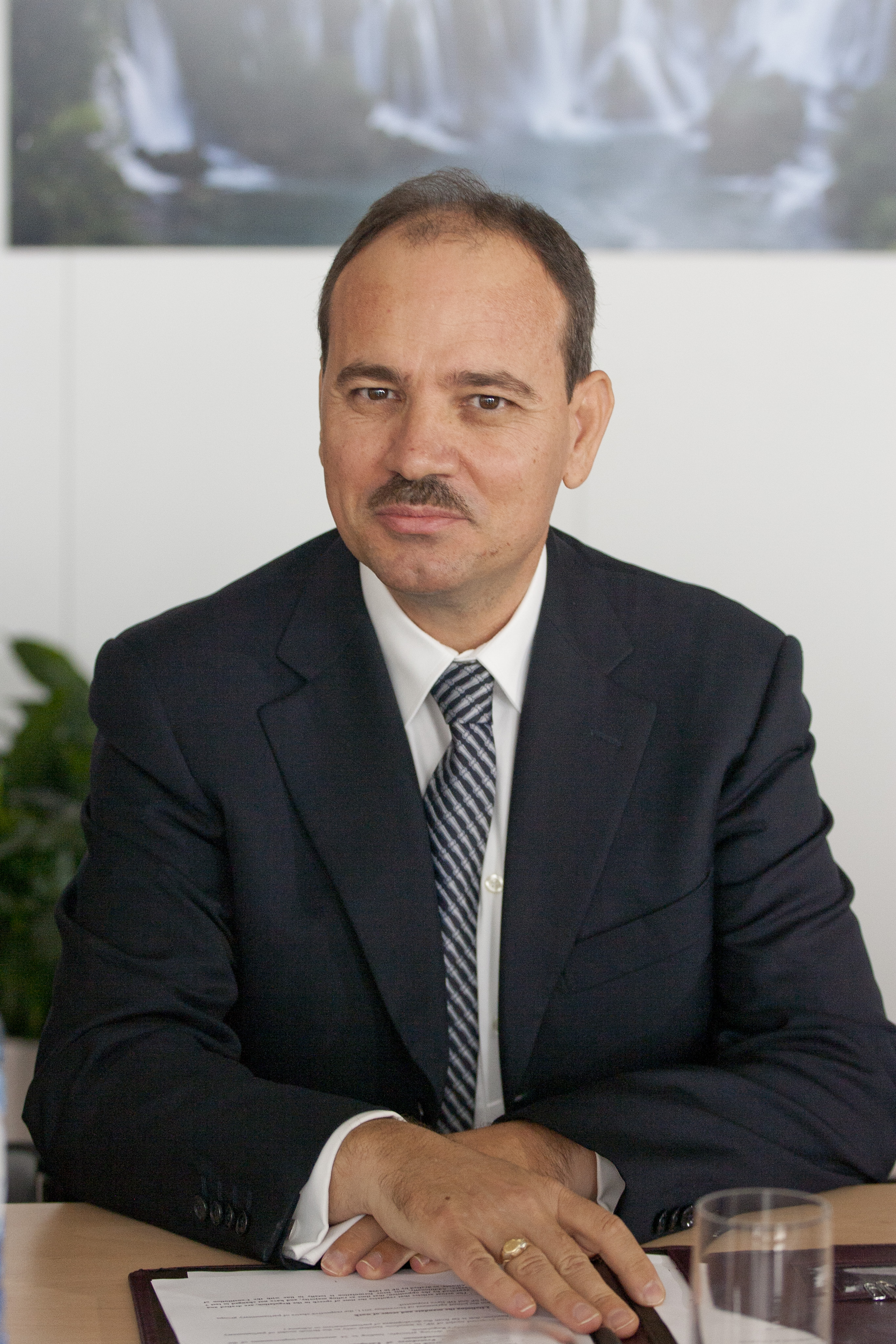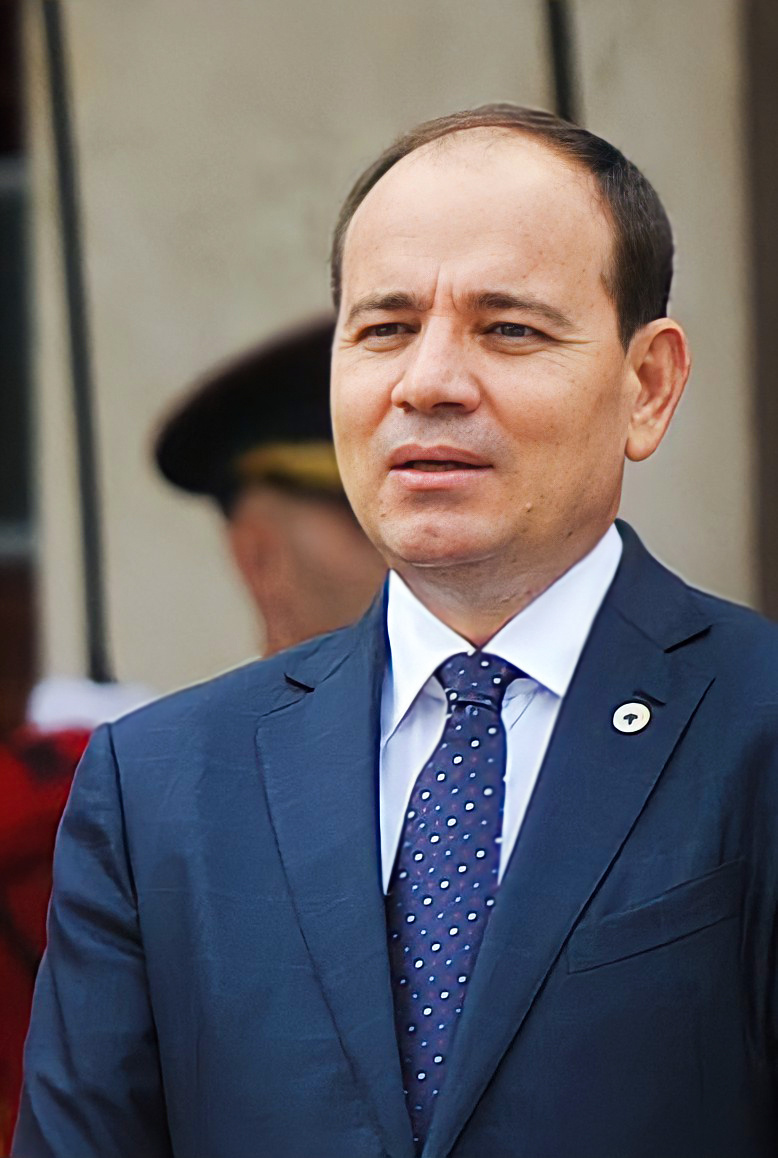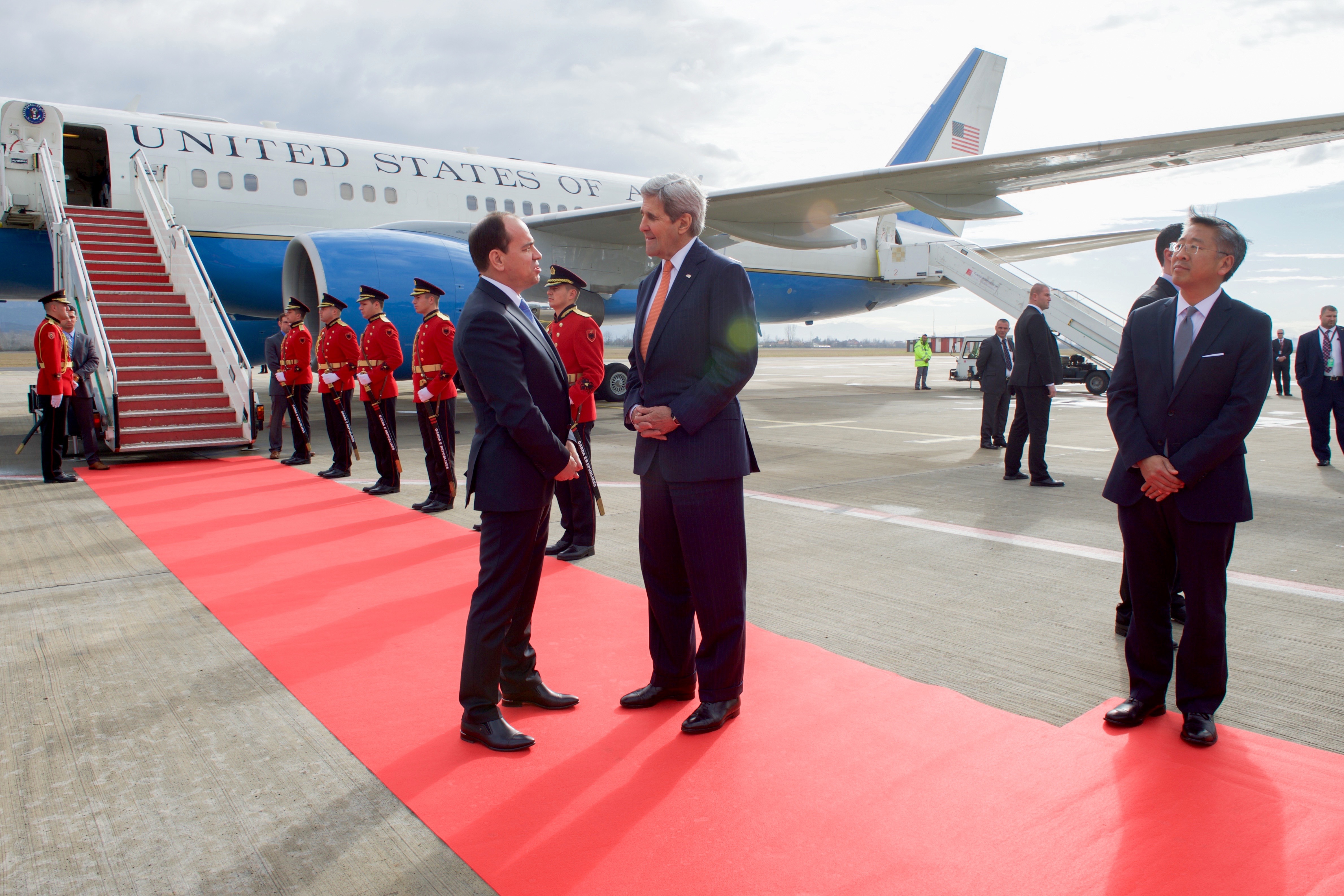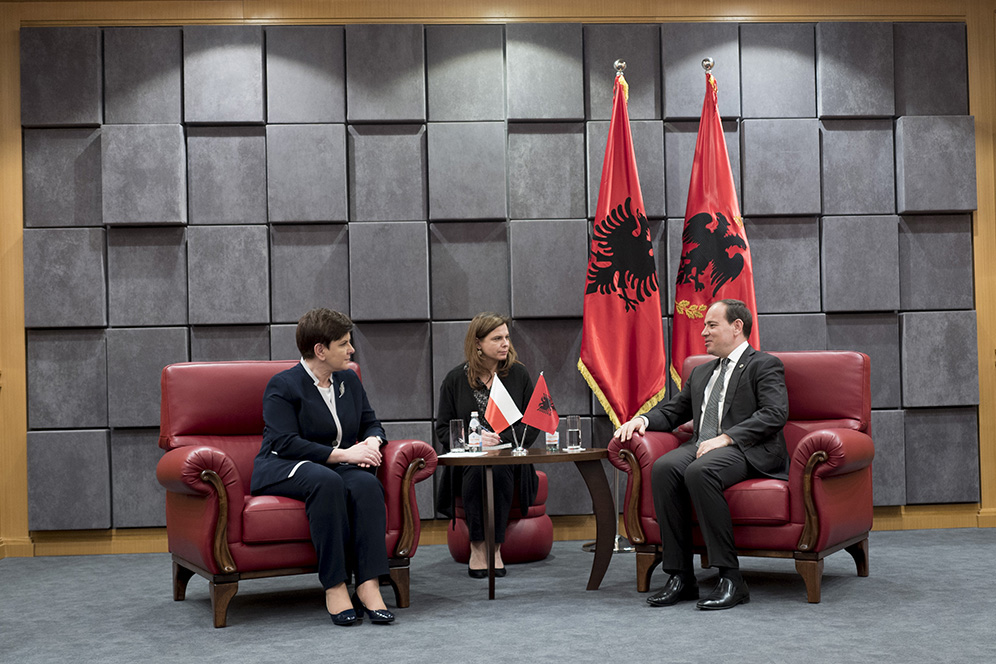1. Overview
Bujar Faik Nishani was an Albanian politician who served as the President of Albania from July 24, 2012, to July 24, 2017. He was the youngest person to assume the presidency, taking office at the age of 45. Prior to his election as president, Nishani held various significant governmental and diplomatic roles, including two terms as Minister of Internal Affairs (2007-2009 and 2011-2012) and a term as Minister of Justice (2009-2011). His presidency was marked by a commitment to reforming the judicial system and advancing Albania's integration into the European Union, reflecting a dedication to democratic principles and rule of law. He also actively pursued policies aimed at strengthening good-neighborly relations and advocating for human rights and international cooperation.
2. Early Life and Education
Bujar Nishani's formative years laid the groundwork for his extensive political and public service career.
2.1. Early Life and Family Background
Bujar Faik Nishani was born in Durrës, Albania, on September 29, 1966. His parents were teachers with roots in Gjirokastër. During the communist era in Albania, Bujar temporarily changed his surname to Mehmeti. He was a distant relative of Omer Nishani, who served as the Chairman of the Presidium of the People's Socialist Republic of Albania.
2.2. Education
Nishani pursued both military and legal education. He graduated from the Skanderbeg Military University in 1988. In 1996, he undertook master's studies in "defense resources management" in the United States at the Naval Postgraduate School. Furthering his academic pursuits, he graduated from the Law Faculty of the University of Tirana in 2004, where he also studied jurisprudence. He completed his master's degree in European studies in 2005, which would later inform his policy goals regarding Albania's European integration.
3. Political Career
Bujar Nishani's political career saw him rise through various ministerial positions before ultimately becoming the head of state.
3.1. Entry into Politics and Early Career
Following the fall of communism in Albania in 1991, Nishani joined the Democratic Party of Albania (DP). His early career was marked by a focus on defense and foreign relations. In 1992, with the appointment of Safet Zhulali as Minister of Defense, Nishani was hired as an expert and Director of Foreign Relations within the ministry. Two years later, in 1994, he transitioned to the Ministry of Foreign Affairs, where he coordinated the NATO Relations Office. He returned to the Ministry of Defense in 1996, serving as Chief of Staff to Safet Zhulali until the Democratic Party lost the 1997 Albanian parliamentary election.
After the 1997 parliamentary election defeat, Nishani briefly served as the chairman of the non-governmental organization (NGO) "Euro-Atlantic Army." In 2001, he was elected as the general secretary of the Democratic Party's branch in Tirana. His political ascent continued in the 2003 Albanian local elections, where he secured a seat in the Tirana Municipal Council. Following this electoral success, Nishani became a member of the Democratic Party's National Council two years later, subsequently joining the party's central presidency. He won a parliamentary seat for Tirana's 34th constituency in the 2005 Albanian parliamentary election, defeating the then-Minister of Interior, Igli Toska. He was re-elected in 2009.
3.2. Ministerial Roles
Nishani served in key ministerial capacities, demonstrating his commitment to public service and governance. He first became Minister of Interior on March 20, 2007, a position he held until September 17, 2009.
Following the 2009 parliamentary election, Nishani was appointed as Minister of Justice, serving from September 17, 2009, to April 25, 2011. After the resignation of Lulzim Basha as Minister of Interior to run for Mayor of Tirana, Nishani was re-appointed as Minister of Interior on April 25, 2011. He held this position until June 12, 2012, when he resigned after winning the presidential election.
3.3. Presidency of Albania
On June 10, 2012, the day before the fourth round of the 2012 Albanian presidential election in the Parliament of Albania, the governing coalition met to discuss new candidates. Bujar Nishani, then Minister of the Interior, was among the proposed names. Although Artan Hoxha was initially agreed upon as the ruling party's candidate, he withdrew his candidacy the following day due to strong opposition criticism. After the vote was postponed, the governing coalition ultimately proposed Nishani, who won the parliamentary vote with 73 votes, supported solely by the governing coalition. Deputies from the then-opposition Socialist Party did not participate in the voting, despite being present.

Bujar Nishani was sworn in as President on July 24, 2012, becoming Albania's youngest president at the age of 45. In his inaugural speech, he declared that his top priorities would be the reform of the judicial system and Albania's integration into the European Union, signaling a strong commitment to strengthening the rule of law and aligning Albania with European democratic standards.
His first state visit abroad was to Kosovo in August 2012, setting a precedent for future Albanian Heads of State. After meeting with President Atifete Jahjaga, Nishani reiterated Albania's unwavering support for Kosovo's independence, emphasizing its irreversibility and the necessity of dialogue to resolve any outstanding issues with Serbia. The issue of Kosovo remained a high priority on his diplomatic agenda throughout his presidency. In 2013, he notably boycotted the summit of ministers of the South-East European Cooperation Process in North Macedonia because the President of Kosovo was not invited due to objections from Serbia. In 2016, he publicly called on the United Nations to recognize Kosovo's independence.
On November 16, 2012, Nishani presided over the return of the body of King Zog I, who had died in exile more than 50 years earlier, allowing for his reburial in Albania.
In July 2013, Nishani called for a referendum on December 22, allowing citizens to decide on the controversial issue of trash imports into the country. In August 2013, he transferred ownership of a large building in Tirana from the Albanian Armed Forces to the Democratic Party for their new headquarters, an action that was met with opposition from the head of the armed forces, Xhemal Gjunkshi. Following the 2013 Albanian parliamentary election in September, he officially named Edi Rama as the new Prime Minister of Albania.

In November 2013, Nishani urged the President of Greece, Karolos Papoulias, to abolish the state of war against Albania, which had been declared in 1940. This move was part of an effort to resolve historical issues, particularly the Cham issue, and he also stated Albania's readiness to resolve the maritime border delimitation dispute with Greece in accordance with international law.
In 2014, Nishani voiced criticism regarding the lack of transparency in the approval process for laws concerning the armed forces and the Defense Intelligence and Security Agency. He also rejected proposed reforms to the Albanian judicial system, arguing that such reforms should be led by judges, not politicians, thereby emphasizing the importance of judicial independence.
During the 2015 Macedonian protests in May 2015, which resulted in several deaths, Nishani called for a swift and complete investigation into the "dark and unclear incident" that had affected not only Kumanovo but also the international community. This demonstrated his concern for human rights and accountability in the region.
On December 17, 2015, the Albanian parliament passed a law prohibiting individuals with criminal records for certain serious crimes from holding public office. In an unusual gesture, Nishani issued a decree for the law to take effect immediately upon parliamentary approval, underscoring his commitment to combating corruption and promoting integrity in public service.

In April 2016, Nishani opposed a government-proposed law that would equate citizenship with the right to bear arms, deeming it "inadequate" and "not positive," reflecting a cautious stance on gun control. The election of nine new Supreme Court judges on June 26, 2016, generated significant controversy within the judiciary, as five of the newly appointed judges accused Nishani and the Supreme Court president of acting without adhering to legally prescribed procedures.

In his final address to the United Nations at the 71st Session of the UN General Assembly in September 2016, Nishani affirmed Albania's commitment to addressing global challenges through close international cooperation. He stated that Albania's actions would include increasing humanitarian aid, ratifying the Paris Agreement on climate change, and implementing all commitments in the security realm, showcasing his dedication to global peace and environmental stewardship. Throughout most of his state visits abroad, Nishani's foreign policy was strongly oriented towards strengthening good-neighborly relations, consistently supporting Kosovo's participation in all multilateral regional and international activities.
Nishani's term as president concluded on July 24, 2017. He was succeeded by Ilir Meta, who took office after winning the 2017 Albanian presidential election.
4. Personal Life
Bujar Nishani was married to Odeta Nishani in 1994, and together they had two children: a son named Ersi and a daughter named Fiona. He was fluent in the English language. Nishani was a Muslim, and on April 21, 2017, he made history by becoming the first Albanian president to undertake a pilgrimage to Mecca.
In 2008, Nishani underwent surgery for a cerebral cavernoma, a type of blood vessel malformation in the brain. Despite the seriousness of the procedure, he resumed his duties as Minister of Interior just two weeks later. He also suffered from a locomotor system disorder, which affected the movement of his left arm and leg.
5. Death
Bujar Nishani was admitted to the hospital due to complications from pneumonia, which was caused by post-COVID-19 fibrosis in his lungs. On April 23, 2022, he was transferred to Germany for specialized medical treatment. He died in Berlin, Germany, at 7 a.m. (06 UTC) on May 28, 2022, at the age of 55.
In the afternoon of May 31, his body arrived back in Albania from Germany, crossing the Kosovo-Albania border at Morinë. Upon arrival, his body lay in state at the Presidential Palace, allowing for public mourning. The Albanian government declared June 2 as a day of national mourning in his honor. The state funeral took place on that day, from 10:00 to 12:00, and Nishani was subsequently buried in the Sharra public cemetery in Tirana.
6. Honors and Awards
Bujar Nishani received numerous national and international honors throughout his distinguished career.
- Honorary Citizen of Libohova, Albania (2013)
- Honorary Citizen of Shkodër, Albania (2016)
- Honorary Citizen of Prizren, Kosovo (2017)
- Honorary Citizen of Glogovac, Kosovo (2017)
6.1. Foreign Honors
- Knight Grand Cross with Collar of the Order of Merit of the Italian Republic (Italy, 2014)
- Raoul Wallenberg Award (United States, 2015)
- First class Order of the Balkan Mountains (Bulgaria, 2016)
- Collar of the Order pro Merito Melitensi (Order of Malta, 2016)
- Order of Freedom (Kosovo, 2017)